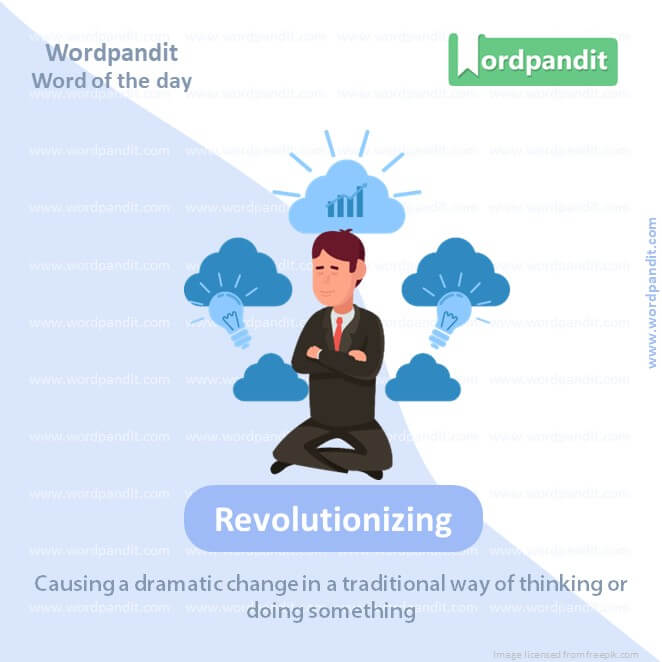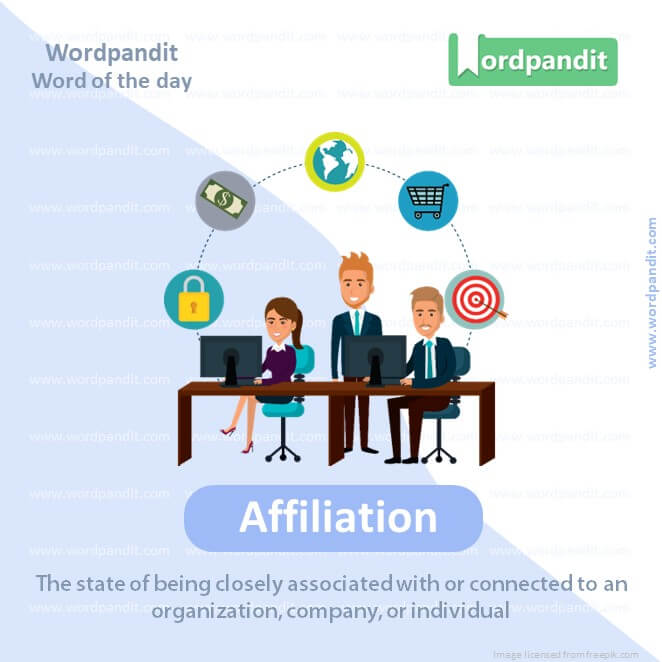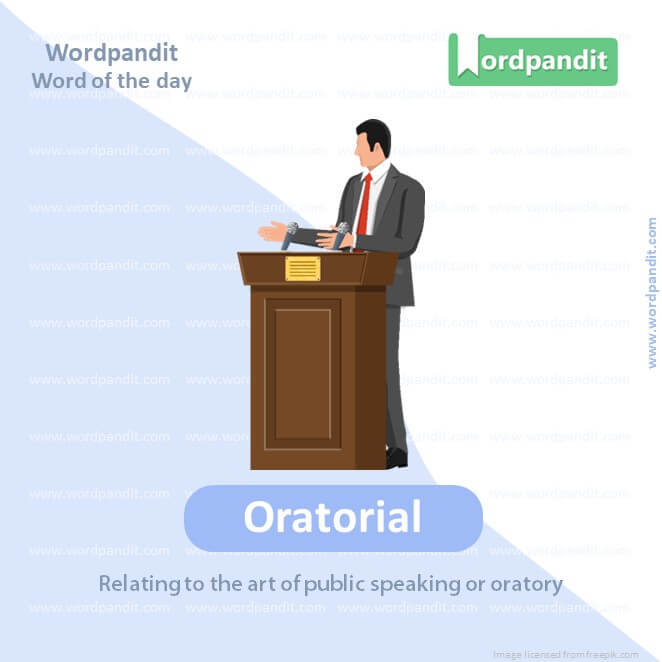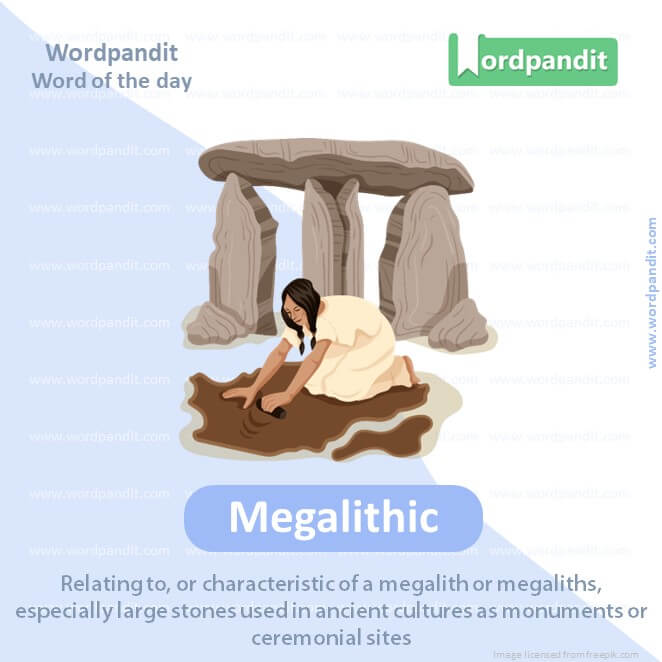Daily Vocabulary Words: List of Daily Used Words in Leading Indian Newspapers
Hi there. Welcome to this special section @ Wordpandit. Our endeavour here is straightforward: highlighting daily vocabulary words that you would come across in leading newspapers in the country. We have included the following newspapers in our selection:
• The Times of India
• The Economic Times
• Hindustan Times
• Mint
• Indian Express
We are putting in extensive work to develop your vocabulary. All you have to do is be regular with this section and check out this post daily. This is your repository of commonly used words; essentially, we are posting a list of daily used words. Hence, this has significant practical application as it teaches you words that are commonly used in leading publications mentioned above.
Visit the website daily to learn words from leading Indian newspapers.

WORD-1: REVOLUTIONIZING
CONTEXT: The introduction of AI in healthcare is revolutionizing the way we diagnose and treat diseases, ensuring a brighter future for the medical industry.
SOURCE: The Times of India
EXPLANATORY PARAGRAPH: “Revolutionizing” is like turning something upside down and making it completely new and better. Like when someone invents a flying car instead of a regular car. They’re changing how we think about cars!
MEANING: Causing a dramatic change in a traditional way of thinking or doing something (verb).
PRONUNCIATION: reh-voh-loo-shun-EYE-zing
SYNONYMS: Transforming, innovating, modernizing, updating, reforming.
USAGE EXAMPLE:
1. The smartphone is revolutionizing the way we communicate.
2. Her research is revolutionizing our understanding of the disease.
3. Digital technology is revolutionizing the movie industry.
4. Online shopping has been revolutionizing retail for years.
WORD-2: WITTICISM
CONTEXT: The finance minister’s speech was not just a presentation of figures; it was sprinkled with witticism that lightened the otherwise serious atmosphere.
SOURCE: The Economic Times
EXPLANATORY PARAGRAPH: A “witticism” is like a funny or clever remark. Imagine someone saying something really smart that also makes everyone laugh!
MEANING: A witty or funny remark (noun).
PRONUNCIATION: WIT-ti-cizm
SYNONYMS: Quip, jest, joke, pun, one-liner.
USAGE EXAMPLE:
1. He always had a witticism ready to lighten the mood.
2. Her witticism made the entire room burst into laughter.
3. She appreciated his witticism, even during serious moments.
4. The speech was filled with his usual witticisms.

WORD-3: THWART
CONTEXT: The security agencies have managed to thwart a major cyber-attack, ensuring the safety of confidential governmental data.
SOURCE: Hindustan Times
EXPLANATORY PARAGRAPH: “Thwart” is like stopping someone from doing what they want. Like if a villain wants to take over the world and a superhero stops him, the superhero has thwarted the villain!
MEANING: Prevent (someone) from accomplishing something (verb).
PRONUNCIATION: THWORT
SYNONYMS: Prevent, stop, obstruct, hinder, block.
USAGE EXAMPLE:
1. The police were able to thwart the criminal’s plans.
2. She tried to thwart his ambitions at every turn.
3. Their efforts were thwarted by bad weather.
4. The new security system thwarted the intruders.

WORD-4: AFFILIATION
CONTEXT: The new educational institution, while independent, has a strong affiliation with some of the country’s top universities, allowing students to benefit from a wider network.
SOURCE: Indian Express
EXPLANATORY PARAGRAPH: “Affiliation” is like being part of a team or a group. Like when you’re on a soccer team, your affiliation is with that team.
MEANING: The state of being closely associated with or connected to an organization, company, or individual (noun).
PRONUNCIATION: af-fil-ee-AY-shun
SYNONYMS: Association, connection, alliance, partnership, membership.
USAGE EXAMPLE:
1. The university has an affiliation with several local colleges.
2. Her affiliation with the club lasted for several years.
3. They inquired about his political affiliations.
4. The event was organized by a charity and its affiliations.
WORD-5: MYRIAD
CONTEXT: The festival celebrated the myriad cultures and traditions of India, showcasing the rich tapestry of our diverse nation.
SOURCE: Mint
EXPLANATORY PARAGRAPH: “Myriad” means a whole lot of something. Imagine looking up at the night sky and seeing countless stars. That’s a myriad of stars!
MEANING: A countless or extremely great number (noun/adjective).
PRONUNCIATION: MIR-ee-ad
SYNONYMS: Multitude, abundance, plethora, mass, host.
USAGE EXAMPLES:
1. The city offers a myriad of entertainment options.
2. He has a myriad of reasons for not going.
3. She’s faced with a myriad of challenges.
4. There’s a myriad of colors in the sunset.

WORD-6: ORATORICAL
CONTEXT: The Prime Minister’s oratorical prowess was on full display during his speech at the United Nations, where he articulated India’s stand on global issues.
SOURCE: The Times of India
EXPLANATORY PARAGRAPH: “Oratorical” is about speaking in public, especially in a way that’s very impressive or emotional. Imagine someone giving a powerful speech with lots of emotion. That’s oratorical!
MEANING: Relating to the art ofpublic speaking or oratory (adjective).
PRONUNCIATION: or-uh-TOR-i-kal
SYNONYMS: Rhetorical, eloquent, declamatory, speechmaking, expressive.
USAGE EXAMPLES:
1. He won the oratorical competition with his moving speech.
2. Her oratorical skills were evident at the conference.
3. The event showcased the oratorical talents of young students.
4. He was known for his oratorical prowess.
WORD-7: TUMULTUOUS
CONTEXT: The stock market has witnessed a tumultuous week, with indices swinging wildly due to geopolitical tensions.
SOURCE: The Economic Times
EXPLANATORY PARAGRAPH: “Tumultuous” is when things are super noisy, chaotic, or full of strong emotions. Imagine being at a big sports game where everyone is cheering, shouting, and there’s so much excitement. That’s tumultuous!
MEANING: Making a loud, confused noise; full of uproar or excitement (adjective).
PRONUNCIATION: too-MUL-choo-us
SYNONYMS: Turbulent, stormy, chaotic, tempestuous, riotous.
USAGE EXAMPLES:
1. The crowd gave a tumultuous applause.
2. They had a tumultuous relationship.
3. The meeting ended in a tumultuous manner.
4. The news was received with tumultuous joy.
WORD-8: SELF-DEPRECATING
CONTEXT: In a rare self-deprecating moment, the celebrity confessed to some of the amusing missteps she made at the start of her career.
SOURCE: Hindustan Times
EXPLANATORY PARAGRAPH: “Self-deprecating” is when someone makes fun of or puts down themselves in a funny or light-hearted way. It’s like when someone says, “Oh, I’m so clumsy!” after they trip over their own feet, but they’re laughing about it.
MEANING: Modest about or critical of oneself, often humorously so (adjective).
PRONUNCIATION: self-DEP-ri-kay-ting
SYNONYMS: Modest, humble, self-critical, self-mocking, self-effacing.
USAGE EXAMPLES:
1. Her self-deprecating humor always made people laugh.
2. He has a charming, self-deprecating manner.
3. Even in success, she remained self-deprecating.
4. His self-deprecating jokes lightened the mood.
WORD-9: NO-BRAINER
CONTEXT: Investing in renewable energy now is a no-brainer, given the clear environmental and economic benefits it promises.
SOURCE: Mint
EXPLANATORY PARAGRAPH: “No-brainer” is a fun way to say that something is super easy to decide or understand. Like if someone offers you ice cream on a hot day, saying “yes” is a no-brainer!
MEANING: A decision or choice that is very easy to make because the answer is obvious (noun).
PRONUNCIATION: noh-BRAY-nur
SYNONYMS: Easy decision, cinch, piece of cake, walk in the park, slam dunk.
USAGE EXAMPLES:
1. Choosing the chocolate cake was a no-brainer for her.
2. Hiring him for the job was a no-brainer because of his experience.
3. Buying the discounted ticket was a no-brainer.
4. For many, voting for the new law was a no-brainer.

WORD-10: MEGALITHIC
CONTEXT: The recent archaeological excavations have unearthed megalithic structures, shedding light on the ancient civilizations that once inhabited the region.
SOURCE: Indian Express
EXPLANATORY PARAGRAPH: “Megalithic” is a word that talks about big, huge stones used a long time ago to build things. Imagine big rocks standing in a circle, like Stonehenge!
MEANING: Relating to, or characteristic of a megalith or megaliths, especially large stones used in ancient cultures as monuments or ceremonial sites (adjective).
PRONUNCIATION: meg-uh-LITH-ik
SYNONYMS: Monolithic, monumental, stone-built, massive, huge.
USAGE EXAMPLES:
1. The megalithic structure has puzzled archaeologists for years.
2. He studied ancient megalithic cultures during his travels.
3. Stonehenge is a famous megalithic site.
4. There are many megalithic tombs in the region.













